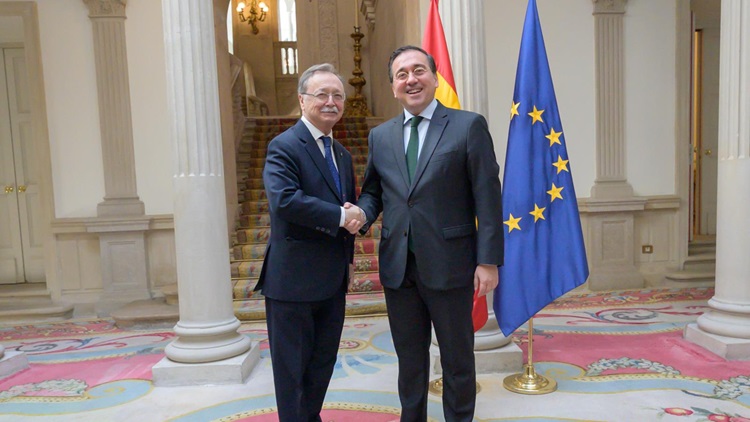Eduardo González
The operation of the Ceuta border in its “condition as the external border of the European Union” and the “current commitment” of the Government to achieve the opening of a commercial customs were the focus of yesterday’s meeting between the Minister of Foreign Affairs, José Manuel Albares, and the president of Ceuta, Juan Vivas.
The meeting, held at the ministerial headquarters of the Viana Palace in Madrid, took place just over two years after the signing in Rabat of the road map between the President of the Government, Pedro Sánchez, and the King of Morocco, Mohamed VI, in by virtue of which the two governments committed to opening a customs office on the Tarajal border, the first in the history of Ceuta. Vivas himself reminded Albares of this commitment during his last meeting, which took place in Madrid in mid-February 2023, more than a year and two months ago.
In mid-February, Pedro Sánchez assured during his official trip to Morocco that he was confident that “soon” there would be “significant progress” in the process of opening land customs in Ceuta and Melilla, because it is an “essential part of our bilateral agenda” and because it will “promote transparent and regular trade that should benefit neighboring regions.”
However, Sánchez did not obtain any specific commitment from the Moroccan authorities in this regard, nor had Albares achieved it during his last trip to Rabat, which took place last December and in which he assured the Moroccan Government that, for part of Spain, “everything is ready so that land customs with Ceuta and Melilla can begin to operate” and, therefore, “no more pilot tests are necessary” (in reference to the three pilot tests carried out in January, February and May 2023).
As reported by Foreign Affairs in a press release, Albares and the president of Ceuta yesterday opted “for establishing a border that functions effectively and regularly and that responds to the principles of efficiency and service to the cities” and recalled that “the opening of “Customs is a commitment of the road map signed between Spain and Morocco, and which has been ratified by Morocco in the meetings that were held in Rabat last December and February.”
Regarding the migration phenomenon, Albares highlighted “the role of Morocco, with which Spain maintains excellent cooperation to control these flows, which reach the EU through the Spanish border”, and both analyzed the data on irregular arrivals to Ceuta in the month of March, “which reflect that arrivals by sea have been reduced to zero, while arrivals by land have been cut by 44% compared to the previous month, reaching 253 people,” added the Ministry.
For its part, the Government of Ceuta specified, in a press release, that during the meeting “the sense of State and institutional loyalty have once again been revealed around the common objective of normalizing the operation of the border in accordance with its status as the external border of the European Union, both with regard to the transit of people and goods.”
Regarding commercial customs, the Ceuta Government continued, “the minister has told the president that its establishment continues to be a current commitment for the Government of the nation, as well as realistic in terms of its execution.”
On the other hand, indicated the same source, both highlighted “the substantial improvement that, with regard to the movement of people, has occurred since the reopening of the border in May 2022 and, as a consequence, to a large extent, the visa requirement for access to Spain for non-residents in the Schengen area.”
Until the COVID-19 pandemic, an exceptional regime governed the Schengen Treaty in Ceuta by which residents in the Moroccan province of Tetouan were allowed to enter Ceuta only with their passport. The restrictions imposed after the pandemic They have been regularly ratified in the BOE, but the Government of Ceuta has repeatedly defended the permanent maintenance of the visa requirement for crossing the Tarajal in order to improve control of people who access the Autonomous City.






